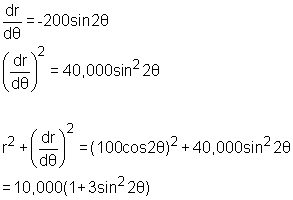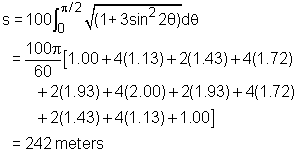| Ch 11. Polar Coordinates | Multimedia Engineering Math | ||||||
|
Polar Coordinates |
Area and Length |
Conic Sections |
|||||
| Area and Length in Polar Coordinates | Case Intro | Theory | Case Solution |
| Chapter |
| 1. Limits |
| 2. Derivatives I |
| 3. Derivatives II |
| 4. Mean Value |
| 5. Curve Sketching |
| 6. Integrals |
| 7. Inverse Functions |
| 8. Integration Tech. |
| 9. Integrate App. |
| 10. Parametric Eqs. |
| 11. Polar Coord. |
| 12. Series |
| Appendix |
| Basic Math |
| Units |
| eBooks |
| Dynamics |
| Fluids |
| Math |
| Mechanics |
| Statics |
| Thermodynamics |
| ©Kurt Gramoll |
|
|
||||||||||||||||||||||||||||||||||||||
Recall that when a curve is given in polar coordinates r = f(θ) for a ≤ θ ≤ b, the arc length of a polar curve is determined as follows: For the given function r = 100cos2θ for 0 ≤ θ ≤ π/2, the derivative dr/dθ is given by The arc length of the ski track is determined as: |
||||||||||||||||||||||||||||||||||||||
|
Since there is no obvious technique to perform the integration, Simpson's Rule is used. According to the Simpson's Rule, an integration can be approximated as, where n is even and Δθ = (b - a)/n. In this case, The values of f(θ) subject to different values of θ are summarized in the table on the left. The integration can then be evaluated to give the length of the ski track as |
|||||||||||||||||||||||||||||||||||||



